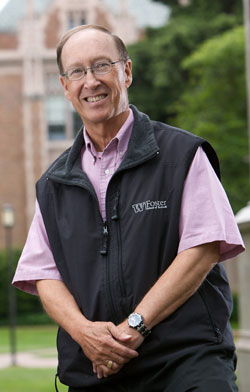Academic powerhouse leads PhD Program with heart and mind
Academic powerhouse leads PhD Program with heart and mind
 There’s not much more for Terry Mitchell to accomplish.
There’s not much more for Terry Mitchell to accomplish.
In four decades as a management professor at the University of Washington Foster School of Business, Mitchell has published more than 120 articles in major journals, delivered more than 120 addresses at major professional meetings, contributed more than 40 chapters to edited volumes and published 4 books.
He has authored formative research in leadership, motivation, decision making and employee retention.
A 2008 Journal of Management study named Mitchell among the 35 most influential management scholars in the world. He also received the 2010 Academy of Management Lifetime Achievement Award.
In the twilight of his brilliant career, Mitchell dedicated his stature, experience and passion to developing tomorrow’s business professors in his former role as director of the UW Foster School of Business PhD Program. “Activist director,” amends Tom Lee, associate dean for academic and faculty affairs, with a smile.
“That’s true,” confirms Mitchell, laughing. “When I took the position, I began doing the same thing I do in my research, which is to go out and talk to people—in this case students and faculty on how the program could be improved.”
Lifting the Foster PhD profile
Mitchell turns opinions into action. Since taking the helm five years ago, he’s worked to improve all facets of the PhD Program and lift its standing inside and outside of the Foster School.
The most competitive prospective students are now flown to campus for recruiting. Key entry test scores and language ability standards have been elevated. An enhanced website and new brochure are helping market the program more effectively. “As a result,” Mitchell says, “we’re getting better and better students.”
Foster School doctoral students now benefit from a mentoring program, a 10-week teaching course, a core of dedicated doctoral courses, a mandatory first-year paper, a formal annual progress report and exit interviews upon graduation. “We’ve worked really hard to see that our students get actively involved in teaching and research quickly,” Mitchell says.
To help place doctoral students in the best faculty positions, each is now mandated to present a job talk in front of faculty. The program also aggressively sends students to network and present research at conferences.
Extension of Mitchell’s work-life balance
Through his long-running doctoral course entitled “The Academic Life,” Mitchell has taught hundreds of young people not only how to survive graduate school, but also how to thrive as a professor, a career far removed from the typical business student’s path. “Initially, the lack of structure causes a lot of doctoral students to struggle,” he says. “So we help them learn to structure their time, prioritize.”
Priority management is a key lesson for a professor-in-training. And Mitchell serves as a sterling exemplar. Master of the work-life blend, he has established himself as a successful academic, though never at the expense of a rich personal life. Outside of work he fishes frequently, follows Duke basketball religiously, collects rare sports memorabilia, plays a mean rock-and-roll piano, even delivers cultural lectures on cruise ships (titles include “Pirates of the Caribbean,” “Can you count in Mayan?” and “There’s gold in them thar’ hills,” depending on the destination).
A rich legacy of Foster PhD alumni
Mitchell insists on making every last bit of work count while at Foster. In the case of the PhD Program, exponentially. Through his policies as former PhD Program director and his example as a smart, caring mentor, he’s created a rich legacy in the legions of students he has influenced.
“Terry was a magnificent mentor and friend throughout my doctoral program,” says Denise Daniels (PhD 1997), associate dean for undergraduate studies at Seattle Pacific University. “I would not be the scholar or teacher that I am without his input.”
“Through his doctoral courses and now his [former] role directing the program, Terry’s influence reaches beyond the publications and presentations that are easily counted,” says Brooks Holtom (PhD 1999), associate professor and interim associate dean at Georgetown University’s McDonough School of Business. “His social capital and immense ability have allowed him to shape education at the Foster School in many ways.”
Adds Will Felps (PhD 2007), an assistant professor at Rotterdam School of Management in the Netherlands, “Terry’s guidance and support has been critical to the success of so many young people.”
The not-so-young as well. “No one in my entire career has been more important in shaping who I am as a scholar and a professor,” says Stephen Green (UW PhD 1976), the Basil S. Turner Distinguished Professor of Management at Purdue University and one of Mitchell’s first students. “To this day, Terry is still the standard by which I judge my performance and contributions. He always inspires me to push myself to do better.”
Mitchell says the inspiration is reciprocal. “I love what I do,” he says. “And a big part of what has made this life, this career so positive is the relationships I’ve had with doctoral students. It’s an honor, an infusion of energy and ideas, to be able to work with some of the brightest young people in the field.”
